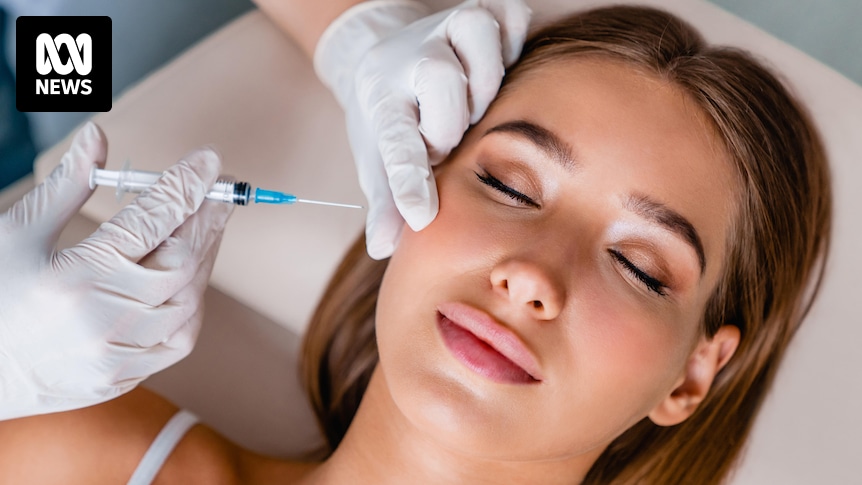Cosmetic procedures are a booming multi-billion-dollar industry, hyped by social media influencers and offering everything from Botox to fat freezing.
For years, nurses and dentists have been working in the sector without needing to do any formal additional education or training before injecting patients with substances like Botox.
But now, new rules have come into place aimed at better protecting patients from unsafe procedures.
So what does it mean for your next appointment? And what are the biggest takeaways from the changes that will affect you?
Firstly, what are cosmetic injectables?
In short, they’re non-surgical, minimally invasive cosmetic treatments.
Dr Christopher Rudge described them as “prescription-only substances” like Botox injections and dermal fillers.
Botox is one of the most common injectables. (Pexels: Jonathan Borba)
But Dr Rudge, deputy director of Sydney health law at the University of Sydney Law School, said the new rules also apply to a raft of other procedures.
These include:
Thread liftsLaser treatmentsBody contouringSo-called fat freezing treatmentsSkin procedures like dermabrasion and chemical peelsSclerotherapy (to treat unwanted veins)UV therapyHair transplantsWhat are the new rules for cosmetic injectables and other procedures?
There are two sets of new guidelines released by the national regulator, known as the Australian Health Practitioner Regulation Agency (AHPRA).
AHPRA said the changes, announced in June, would help guarantee that patient welfare came before a business’s bottom line.
The first change, Dr Rudge explained, related to practitioner conduct, or “what happens inside the clinic”, such as additional training, informed consent and safety assessments.
The new rules include additional training for practitioners like nurses. (Supplied: Adobe Stock/hedgehog94)
“You’ve got mandatory patient suitability screening. This is a crucial change that requires each patient who attends a clinic to be given a holistic or comprehensive assessment of their particular concerns relating to the treatment,” Dr Rudge said.
He said screening patients for underlying conditions, such as body dysmorphic disorder, allowed for a better understanding of their motivation for seeking treatment.
The new rules also introduce minimum periods of experience required for nurses wanting to work with injectables.
The other set of guidelines focused on advertising.
For example, restricting before-and-after images as well as strengthening the ban on the use of testimonials.
“It’s about what the public sees, and these are designed to stop misleading, trivialising and predatory marketing,” he said.
“Any images must be realistic and educational rather than entertainment or advertising. It’s quite a difficult boundary to police, but I think the clear message is that you would not be on good ground as a practitioner if you displayed before and after [images] online.”
Influencers under the spotlight
The guidelines also crack down on how social media influencers are used by practitioners.
“Practitioners can no longer hide behind social media influencers. If [the influencer] does the wrong thing, the practitioner is now responsible for that,” he said.
Influencers also aren’t allowed to receive any freebies or discounts in exchange for promoting a clinic.
Practitioners are responsible for how they include influencers as part of any advertising. (ABC News: Elise Pianegonda)
And if you’re under 18, there’s a mandatory seven-day cooling-off period between your first consultation and any procedures.
AHPRA CEO Justin Untersteiner said practitioners have had a few months to get on board with the rules, which came into effect this month.
‘Practitioners have been warned. If we find practitioners prioritising profits over patient care, we will not hesitate to act,” he said.
What qualifications do you need to administer cosmetic injectables?
Procedures like Botox are prescription-only.
Medical doctors, as well as some nurses and dentists, can prescribe and administer cosmetic injectables.
But there have been cases of non-registered practitioners and clinics using off-brand or out-of-date dermal fillers and Botox, leading to multiple hospitalisations after patients became sick with botulism.
AHPRA said between September 2022 and March 2025, it investigated 360 complaints related to non-surgical cosmetic procedures. These were related to a range of health professionals.
What do these new rules mean for people getting cosmetic injectables?
In short, the goal is to put patient safety before sales and social media hype.
“This is the first time that there have been specific sets of rules that apply to all registered health practitioners, not just doctors,” Dr Rudge said.
But the system relies on people reporting any breaches to the regulator, AHPRA.
“These rules provide a kind of menu that AHPRA can use to legitimately sanction and deregister practitioners,” he said.
Loading…

